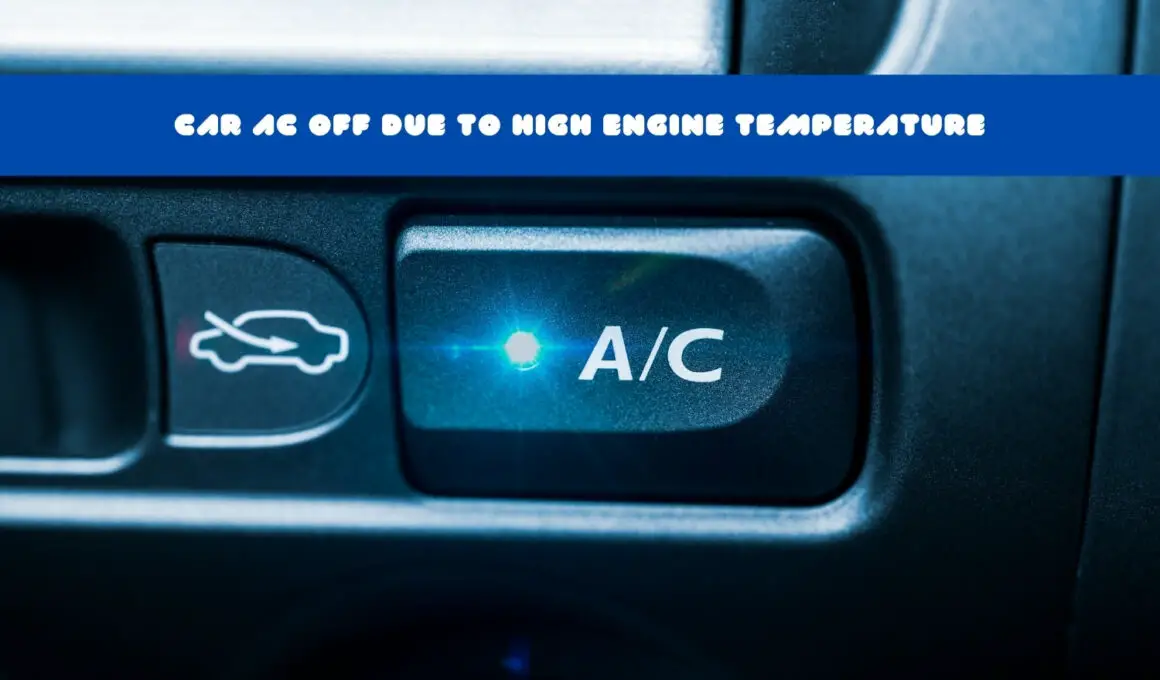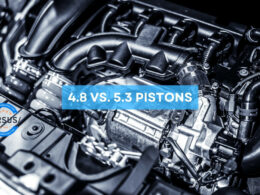In This Article Show
Have you ever seen the “AC Off Due To High Engine Temperature” sign on your dashboard and would like to know what it means and what to do to fix this issue? If this is you, then this guide is for you.
This article discusses what that sign means, the causes, how to fix the issue, and how to prevent it from happening again. Without any further ado, let’s get right to it.
NEW: Is It Safe To Drive With A Broken Brake Line?
What Does ‘’AC Off Due To High Engine Temp’’ Mean?
AC due to high engine temp shows on your dashboard when the PCM (engine computer) senses extreme heat or an inoperative electric cooling fan.
Simply put, your car engine is hot or overheated, and to avoid more heat that can cause damage, the AC turns off.
One of a vehicle’s safety features is the engine control unit (ECU). The ECU has a system that regulates and pilots all engine activities by collecting data from sensors in the car.
This signal is then transferred to the ECU for processing, and the signal makes actuators such as ignition angle, automatic throttle, and fuel regulation work.
When the ECU senses the temperature in the engine is very high, automatic regulation of the air conditioner system is made.
What Causes A Car To Display “AC Off Due To High Engine Temperature”?
Here are some things that can cause this issue:

1. Leak or Drop In Coolant levels
Coolant is pumped when a car engine emits heat, and this coolant regulates the engine. The fan cools the resulting hot water, moves to the tank, and redistributes it to the engine.
If any issues arise from the coolant, like blockages, leaks, or the coolant level drops more than normal, a disruption of the cooling process will occur, and the AC will be turned off as a result.
2. Bad AC Compressor
An AC compressor transforms refrigerant gas into liquid through the condenser.
If the AC compressor is faulty, cold air will not be sent into the car, and no refrigerant will flow into the air conditioning system. When this happens, the car engine temperature will be unstable, and the AC will go off.
3. Faulty Cooling Fan
The cooling fan is very important in the cooling system as it takes away excess heat absorbed from the engine using coolant.
It absorbs the heat and moves into the radiator, where the heat is blown away. If the faulty cooling fan, excess heat will not be blown away, causing the engine to overheat.

4. Faulty Thermostat Valve
In a car’s cooling system, the thermostat synchronizes the cooling fluid. The valve lets the fluid go to the engine part if the temperature reaches a certain point.
If the thermostat is obstructed or faulty, the coolant will not get to the engine to regulate it, causing it to overheat.
5. Engine Coolant Temperature Sensor Error
The coolant temperature sensor(ECT) regulates the coolant mixture’s temperature and sends a signal to the ECU.
The ECU can modify the necessary components to keep the engine running at the correct temperature. If this sensor malfunctions, the cooling fan will operate inaccurately, making the engine overheat.
Some other things that can cause the “AC Off Due To High Engine Temperature” to appear on your dashboard include a damaged head gasket, faulty oil pump, and inadequate water pump.
What To Do When The “AC Off Due To High Engine Temperature” Sign Appears
The first thing to do when you see the sign ‘’AC turned off due to high engine temp’’ on your dashboard while driving is to switch on emergency lights so other vehicles know something is wrong with your vehicle and park in a safe place.
Then allow your vehicle to rest for about 15-20 minutes, and check the temperature gauge to be sure there’s no damage to your engine.
Check the coolant reservoir of your engine for any leaks, and also check your car radiator and cooling fans.
You must be extremely careful when checking to avoid touching any hot component or water with your skin.
While your car is in park mode, rev your engine to make the fans and water pump effective. This way, air, and water can go through the radiator quicker, so the engine will cool down a bit.
After the engine has cooled down, take the vehicle to an automobile repair shop for further and proper diagnostics to find the cause of this issue and fix it.
How To Prevent Car AC Off Due To High Engine Temperature Issues
To prevent or reduce the chances of this sign from appearing on your dashboard, you should: Always run your AC for 10-15 minutes once a week.
This way, air pressure can be maintained to keep the compressor in great shape.
Also, make sure you change the engine oil regularly, recharge the AC system every two years, and regularly visit the mechanic workshop for proper inspection and maintenance.
Frequently Asked Questions
Why does my car AC turn off when the engine temperature is too high?
When your car’s engine temperature rises excessively, it can potentially overheat. This is a serious situation that can cause significant damage to your vehicle. To prevent overheating, your car’s computer might automatically turn off systems that contribute to heat generation or aren’t critical to vehicle operation, such as the air conditioning (AC). This helps reduce the load on the engine and allows it to cool down.
What can cause high engine temperatures that lead to the AC turning off?
Several issues, including a malfunctioning cooling system, low coolant levels, a clogged radiator, a broken water pump, or a stuck thermostat can cause high engine temperatures. Any of these issues can prevent the engine from dissipating heat effectively, leading to an increase in temperature and potentially causing the AC to shut off.
What should I do if my car’s AC turns off due to high engine temperature?
First, you should pull over as soon as it’s safe to do so and turn off the engine to let it cool down. Don’t open the hood immediately, as the components will be extremely hot. Once the engine cools down, check the coolant level and inspect for visible leaks. If the problem persists, seek professional help. Driving with an overheating engine can lead to significant damage.
Can I prevent my car’s AC from turning off due to high engine temperatures?
Yes, by maintaining your car’s cooling system properly, you can prevent situations of overheating. Regularly check your coolant levels, inspect and clean your radiator, and ensure your thermostat and water pump are in good working order. Regular servicing of your vehicle is key to preventing such issues.
More Reading:










